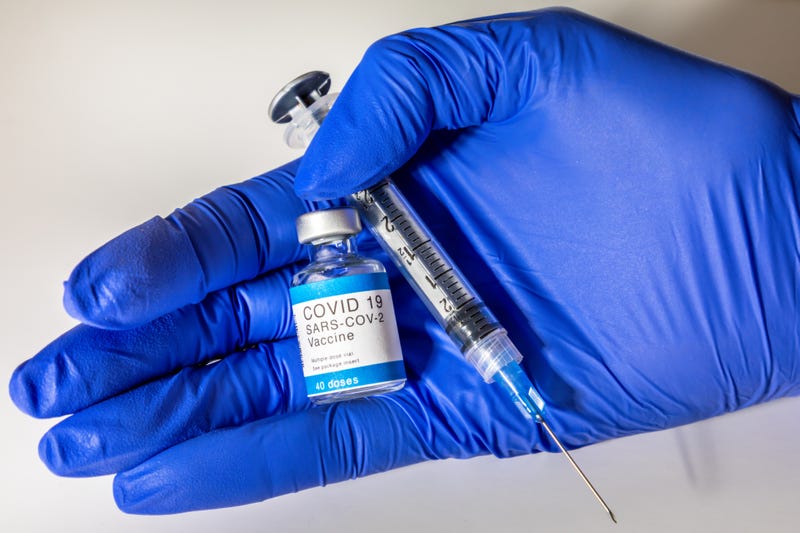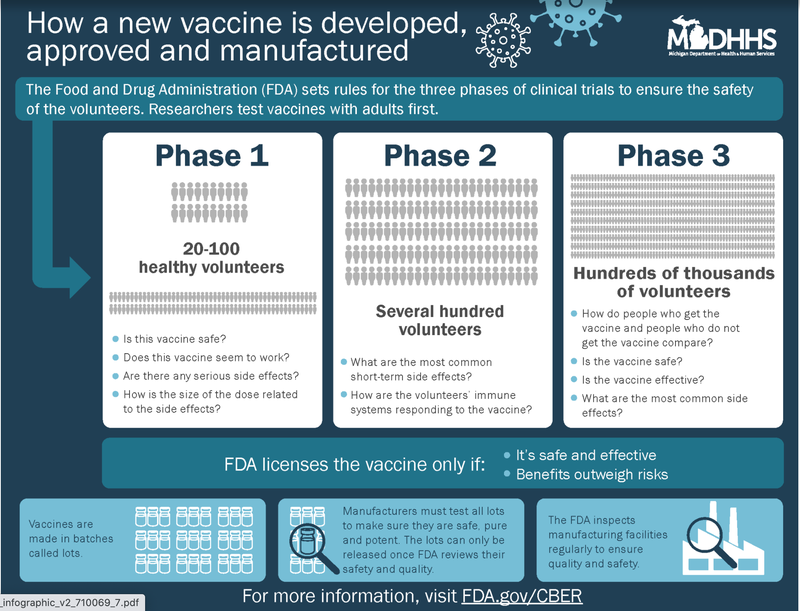
(WWJ/AP) The Michigan Department of Health and Human Services (MDHHS) said some healthcare workers across the state may be vaccinated as soon as Monday.
MDHHS told WWJ Michigan will be allotted 84,825 doses of the Pfizer vaccine in the first distribution.
They will go to 56 hospitals and 16 local health departments that have installed ultra-cold freezers. Both Macomb and Oakland County have installed the freezers that can accommodate the -70-degree Celsius temperatures the vaccine needs to be kept at. Wayne County has also announced plans to purchase the freezers.
The nationwide mass effort to vaccinate the country against COVID-19 began at Pfizer’s plant in Portage near Kalamazoo, where the shipments were deployed from Sunday. An entire runway at Gerald Ford International Airport in Grand Rapids was dedicated to planes carrying the vaccine.
“This is great news for our families, frontline workers, small businesses and economy,” Governor Gretchen Whitmer said in a statement. “In Michigan, a state built on hard work and innovation, a safe and effective COVID-19 vaccine will be manufactured by Michigan workers at a Michigan business.”
Fed-Ex is working with the Federal Aviation Administration to ensure priority is given to planes that are a part of the effort.
The Associated Press reports 3 million doses of the vaccine (the Pfizer vaccine requires 2 doses) will be distributed to the United States in the first shipment.
By the end of the year, U.S. officials expect to have enough to give about 20 million people their first doses (which means an extra 20 million shots would be available for the boosters). That is about 6% of the total United States population.
Officials say they expect to be able to vaccinate an additional 30 million people in January and 50 million more in February.
If Moderna or other vaccines in the final trial phases get FDA approval in coming weeks, this number is expected to be even higher.

So, what does this mean for us here in Michigan:
Who gets the vaccine first?
The phases are as follows:
Phase 1A includes paid and unpaid persons serving in health care settings who have direct or indirect exposure to patients or infectious materials and are unable to work from home, as well as residents of long-term care facilities.
Crain’s Business Detroit reports Michigan employed about 602,000 employees in the healthcare sector as of February 2020.
As many as one third of the state’s deaths occurred in nursing homes or longterm care facilities.
Phase 1B includes some workers in essential and critical industries as defined by the Cyber Security and Infrastructure Security Industry, including workers with unique skill sets such as non-hospital or non-public health laboratories and mortuary services.
Phase 1C includes people at high risk for severe COVID-19 illness due to underlying medical conditions, and people 65 years and older. See who is considered at increased risk here.
Phase 2 is a mass vaccination campaign for all adults.
MDHHS says these phases are likely to overlap, meaning one phase will not be complete before another phase begins.
At this time, MDHHS does not recommend children under 18 and pregnant women receive the vaccine, pending further research.
Michigan Chief Medical Executive Dr. Joneigh Khaldun said the choice was made by prioritizing keeping Michigan’s healthcare system and essential services functioning. Another goal at top-of-mind is protecting those who are most vulnerable to COVID-19.
When will the vaccine be available to the general public?
Most health officials, both state and national, say the vaccine will likely be available by mid to late spring to anyone who is recommended to receive it.
Dr. Khaldun announced a goal of vaccinating 70% of Michigan’s adult population—about 5.4 million people—by the end of 2021.
Where will the vaccine be available?
Doctor’s offices, clinics and pharmacies who are enrolled in the vaccination program will be able to offer the vaccine when its available to them.
The Centers for Disease Control and Prevention will enter a partnership with CVS and Walgreens to vaccinate residents of long-term care facilities. The Michigan National Guard will also be helping to deploy the vaccine in hospitals and long-term care facilities, including nursing homes.
The general public will also be able to get their vaccines at Walgreens, CVS and local hospitals when it's their turn.
Dr. Khaldun said all adults in Michigan should be talking to their healthcare provider and thinking about how to get the vaccine when it’s their turn.
How will I be reminded to get a second dose?
A COVID-19 vaccination card will be provided to you when you get your first dose. There will be a place on it to write down a second dose reminder, and an approximate time you should get it. The MDHHS is also working on a text message reminder system for residents who have a smart phone.
How do I know it’s safe?
The vaccine has already been given to hundreds of thousands of volunteers during trials, with no serious side effects reported. The MDHHS said those effects include a sore, red arm that is warm to the touch; a low-grade fever, headache and just a general feeling of “not yourself.” The side effects almost always disappear in a day or two, according to health officials.
While scientists worldwide are working at an unprecedented speed to develop a COVID-19 vaccine, they are still following a proven process—Dr. Khaldun said. Scientists had already begun the process of researching coronavirus vaccines during earlier outbreaks caused by related similar viruses such SARS (Severe Acute Respiratory Syndrome) in 2003 and MERS (Middle East Respiratory Syndrome) in 2018. That allowed scientists to get a jump start in researching COVID-19 vaccines.
FOR A FULL LIST OF MDHHS FAQ'S ABOUT THE COVID-19 VACCINE, CLICK HERE.






